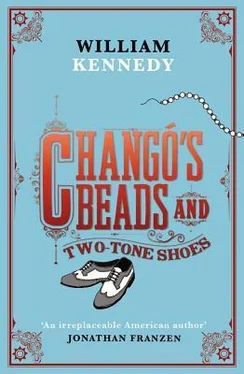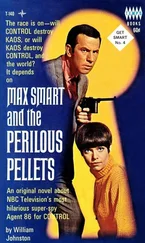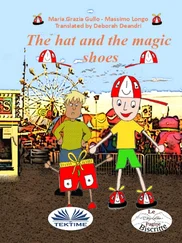“Neither have I.”
“Do you no longer love me?”
“It’s very hard to say.”
“Try to say it.”
“I find it very difficult to love you.”
“But do you?”
“Well, somehow, somehow, yes, though I often think of it as my misfortune.”
“But it is love. You still know what love is. It is still love.”
“Such as it is, it still seems to be love.”
“Then show me your misfortune. This is a night like we have never had. You don’t understand that yet, but I do. I see you more clearly than ever. I know you. Put your misfortune into me.”
Quinn shifted his weight toward her and stared her down. “All right,” he said, “but I’m not paying for this.”

They were nine at a table for eight, the chicken dinners of all but Roy in shreds and bones, and two new bottles of wine and another round for the Schlitz drinkers were on the table, ordered by Quinn. George and Vivian, Matt and Martin, then Tremont straggled in, Roy and Gloria arrived half an hour later, and Quinn and Renata finally returned after their disappearance, but without Max. Cody was at the piano, and he paused to say now he wanted to do a piece he’d written and recorded in memory of Fats Waller. He called it “Blues for Fats,” who was a brilliant musician and funny and lived to play, too hard, played around the clock and kept going, dead at thirty-nine from an overdose of life. Cody had started this tune as an improvisation of what he’d felt about the man, then kept it going like Fats at a party, meditating on his early death and the depth of his talent, keeping it slow; but the piece got longer, eight choruses, right hand wailing melancholy arpeggios in the high register, Fats liked Bach, and then a last low chord and fade, the way Fats did. Cody stood up from the piano and the applause was wild, long, real, and it put a smile on his face that did not fade. He said he was going to cool out but he’d be back.
Mike Flanagan and his group moved back in, launched “If I Could Be with You” and people danced. Cody tried table-hopping to thank his roomful of friends but at the second table he felt weak and had to sit. Roy went to his table and touched his shoulder. Cody grabbed his hand and stood and gripped his arm. “You got out,” Cody said, and his smile grew larger as they moved to a corner where Roy gave his father the news.
“I’m surprised you’re here,” Matt said when Roy came back to the table. “You had a rough night.”
“This is Cody’s night. I thought I’d miss him.”
“What’d they charge you with?”
“Participating in a riot. The lawyer says they want me for inciting riot, that I told those guys at the Four Spot the cops had shotguns but I could get them guns to fight back.”
“I was there. I didn’t hear you say that.”
“Albany cops do their thing. In the last eight months they busted all ten members of the Brothers’ Council, me and Ben twice, and we both did time. Not one of the charges was worth a damn and most of them were thrown out, but they keep it up. Harass those mothers and maybe they’ll go away.”
“Maybe they confused you with Zuki. He could’ve come up with some guns.”
“That son of a bitch has a lot to answer for.”
“I gave him an act of penance down on Bleecker Street. I bloodied his nose. He was giving heat to Tremont.”
“Best news I heard all day.”
“Did you hear Tremont broke up a riot on Bleecker Street?” Quinn asked Roy.
“I heard he misbehaved,” Roy said.
“Whites in cars came through with Molotovs and got trapped, people hacking, kicking one another, knives, wrecked cars, two or three houses on fire, and then Tremont walks out of the alley, unwraps his AR-15 and bang bangety bang—‘Enough,’ Tremont says, and the riot falls apart. People run off, cops arrive, not much left for them to do, but they arrest a dozen and carry off the wounded. I think Tremont saved lives. The AR-15 is his musical instrument of choice. You can’t predict Tremont. At the First Church he serenaded the protesters with ‘Coon, Coon, Coon, I Wish My Color Would Fade.’”
“I remember that,” Martin said. “Nineteen-oh-one. A huge hit.”
George sang the second line: “Coon, coon, coon, I want a different shade. .”
“We don’t have to sing it, Pop,” Quinn said. “I thought they’d strangle Tremont so I got him out quicktime.”
“They wouldn’ta strangled me,” Tremont said.
“You never know with liberals. I wasn’t taking chances.”
“Why’d you sing that, Tremont?” Roy asked.
“I’m sick of them songs about overcomin’. What we gotta do is change color. We’d fit in better. Wouldn’t need no segregation.”
“You’re a clown, Tremont, but you can’t do that old shit, tommin’ the crowd, scratchin’ your head.”
“‘Man in the Moon Is a Coon,’” Tremont said. “‘Shine,’ ‘All Coons Look Alike to Me.’”
“Right,” said Roy. “Deep trash.”
“My daddy made a career singin’ those tunes. That’s the way it was.”
“Long gone.”
“You ever hear the Mills Brothers and Bing Crosby do ‘Shine’?” Quinn asked.
“Doesn’t matter. You can’t shine shit.”
Cody had been listening to the talk, standing behind Roy.
“I recorded ‘Shine’ with Count Basie,” he said, pulling a chair next to Roy.
“I heard you do it with Crosby when I was a kid,” Quinn said. “It was great.”
“When Bing and the Mills Brothers sing it it’s a joke. Always was. And the joke’s on the guy who calls you shine.”
“All right,” Roy said, “all right. If Cody does it it’s all right.”
“Cody’s all right,” Tremont said, “but my daddy’s shit you can’t shine.”
“Not your daddy, Tremont, the coon, the coon. Je-zus.”
“Satchmo sang ‘Shine,’” Tremont said.
“Satchmo,” Roy said. “He smiles a whole lot for white people.”
“Ella sang ‘Shine,’” Cody said. “So did Django.”
“Hey, Roy,” Quinn said. “What happened to your sense of humor? Tremont was putting everybody on. That song is so far out it’s anti-racist.”
“Coons aren’t funny,” Roy said. “All that coon stuff is rat shit. Flush it all.”
“How about shines?” Cody said.
“Oh, man, oh, man,” Roy said, and he twisted in his chair to face Gloria.
“Don’t get excited, Roy,” she said. “Tonight’s important, don’t fight with your father.”
“Damn,” Roy said, “it’s so nice you’re here. But I don’t want you here. I want you someplace else. We’ll blow this joint.”
“To go where?”
“Someplace quiet.”
The father and son squabbling over the coon factor crystallized a musical lineage for Quinn — the slaves singing, dancing, cakewalking in their Pinkster revels, whites imitating them by blackening up as minstrels and turning it all into a theatrical phenomenon that would last more than a century, blacks then blackening their blackness and creating their own minstrel stage — mocking the white imitation of their cakewalk and the white-black argot, and filling theaters; Big Jim making the leap from sideshow minstrel to black theater and he’s along for the ride when the slave song and dance (and the coon factor) arrive on Broadway, a long walk from slavery. Bert Williams is Broadway’s black megastar as a singing blackface shuffler, Al Jolson is a white Broadway megastar in blackface, Satchmo, the ragtime genius trumpeter sings to the world in his arcane language of scat, and ragtime turns into jazz, a word Satchmo never liked. Bing Crosby and the Mills Brothers learn scat from Satchmo and rock the world with “Shine” and “Dinah.” Fats, another smiling clown and musical wizard, discovers Cody Mason plays fine piano, and Cody emerges into jazz, formerly ragtime, first accompanist and early lover of Billie Holiday, the great-granddaughter of a slave: how those slaves do rise. Cody sees all these connections, understands where he came from, and how he got here, understands also that Roy now wants to obliterate this matrix that created his father and himself; and Cody quietly implodes.
Читать дальше













